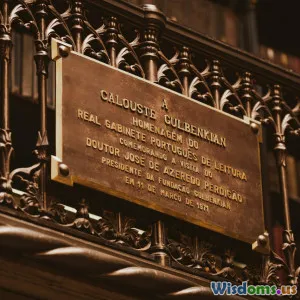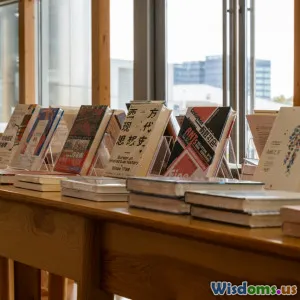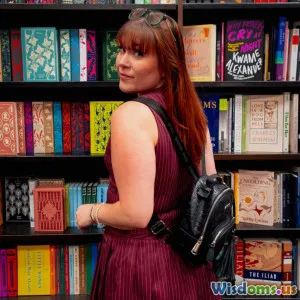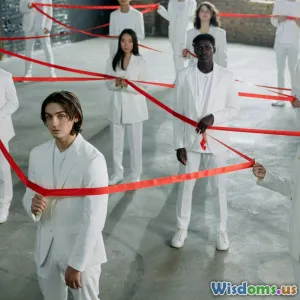
From Rejection to Recognition Authors Who Almost Missed Major Literary Honors
9 min read Explore remarkable authors who faced rejection before winning major literary honors, revealing the resilience and persistence needed for true recognition. (0 Reviews)
From Rejection to Recognition: Authors Who Almost Missed Major Literary Honors
Introduction
Every renowned author has an origin story – often layered with dreams, diligence, and, unexpectedly, rejection. While literary awards symbolize the pinnacle of recognition, the journey to acquiring them is rarely straightforward. Numerous celebrated authors who have left an indelible mark on literature hauled through waves of refusals, unrecognized manuscripts, or personal self-doubt before finally basking in the glow of major honors.
This exploration dives into some extraordinary narratives of authors who almost missed out on prestigious literary titles. Understanding their trials and ultimate triumphs not only gifts us inspiring tales but also offers invaluable lessons in resilience, persistence, and hope for aspiring creatives worldwide.
When Rejection Heralded Recognition: The Literary World’s Paradox
The literary world strikes a curious equilibrium between subjective taste and critical acclaim. This dichotomy means today's overlooked manuscript could be tomorrow's award-winning classic. Major literary honors — like the Nobel Prize in Literature, the Booker Prize, or the Pulitzer Prize — are prestigious but are also subject to the tastes and politics of committees and eras.
For many authors, initial rejection is not just a side effect of the creative process but sometimes a barrier signaling a clash between their groundbreaking ideas and the prevailing literary norms.
Why Do Rejections Happen?
- Market and commercial viability: Publishers often reject manuscripts fearing they won’t sell.
- Ahead of their time: Innovative or controversial works threaten established norms.
- Subjectivity of literary gatekeepers: Personal biases and tastes influence decisions.
Yet, rejection does not equal lack of merit. In fact, it often precedes revolutionary success.
Legendary Stories of Near Misses and Ultimate Triumphs
1. J.K. Rowling and the Harry Potter Series
Perhaps the most emblematic example of authorial rejection is J.K. Rowling. The manuscript for Harry Potter and the Philosopher’s Stone was famously rejected by 12 publishers before Bloomsbury took it on. The initial reluctance stemmed from doubts about the market for a children's fantasy novel centered on a young wizard.
Rowling’s perseverance turned those initial rejections into the launchpad for one of the best-selling book series in history. The Harry Potter series won multiple literary awards and altered children’s literature forever, including winning the Hugo Award and the Nestlé Smarties Book Prize.
2. William Golding and Lord of the Flies
Before it became a staple in literary criticism and school curricula, Lord of the Flies endured rejection. Golding struggled for years, with the book turned down by several publishers who did not see commercial potential in his dark, allegorical narrative.
Finally published in 1954, the novel not only revived Golding’s career but led him to receive the Nobel Prize in Literature in 1983. His story reminds us that publishers' hesitation can sometimes mask lasting cultural significance.
3. Gabriel García Márquez’s Odyssey to Nobel Glory
The Colombian master Gabriel García Márquez faced professional and political hurdles that overshadowed potential recognition. His early works suffered from rejection and controversy, often considered too rooted in magical realism for conventional taste.
Despite this, García Márquez's One Hundred Years of Solitude remains a literary landmark, shaping Latin American literature globally. His narrative persistence culminated in him receiving the Nobel Prize in Literature in 1982, underscoring how visionary writing often faces initial resistance.
4. Sylvia Plath: Posthumous Recognition After Struggle
Sylvia Plath's poems and novels frequently encountered the cold shoulder during her lifetime due to their intense emotional content and nonconformity. Although she never received major awards while alive, posthumous collectivism celebrated her contributions.
Her novel The Bell Jar and poetic works ultimately elevated her to iconic status. Plath's story illustrates how major honors, recognition, and influence can emerge beyond an author's lifetime.
What Can Aspiring Authors Learn?
Embracing Resilience as a Core Craft
Rejection tempers creative ambitions. It forces authors to refine their voice and sometimes rethink their approach without losing authenticity. Consider Louise Glück, the 2020 Nobel Laureate, who endured decades of quieter recognition before her extraordinary poetic voice gained definitive acclaim.
Persistence Sparks Opportunity
The setbacks faced by Tolkien in getting The Lord of the Rings published or Cynthia Ozick whose premier works like The Shawl initially puzzled critics illustrate that persevering often opens doors previously hidden.
The Power of Belief and Authenticity
Authors who held steadfast to their unique perspectives, like Toni Morrison, who received the Nobel Prize in 1993, demonstrate that honoring one’s truth pays dividends—even if early rejection seems overwhelming.
Networking and Finding the Right Publisher or Community
Sometimes, the right advocate within publishing or literary circles dramatically alters an author's career trajectory. For example, Maxwell Perkins, editor to Hemingway and Fitzgerald, was a pivotal figure in shaping American literature by believing in authors potentially overlooked by others.
The Role of Literary Awards: Validation or Gatekeeping?
While literary awards confer significant validation and visibility, it is critical to understand their limitations:
- Subjectivity: Different cultures and committees reflect various sensibilities.
- Time Lag for Recognition: Not all were immediate- some were decades later.
- Diverse Literatures: Awards can sometimes miss marginalized voices or unconventional genres.
Nonetheless, they often help authors traverse from obscurity to broad recognition, much as the authors highlighted in this article illustrate.
Conclusion
The road from rejection to recognition is often turbulent, peppered with setbacks but ultimately illuminating the power of tenacity in art. These stories remind us that literary merit is rarely immediate and often misunderstood. They inspire writers and creatives everywhere to cling to their vision, despite obstacles, because great storytelling has enduring power beyond initial reception.
By learning from these authors’ journeys — Rowling’s indomitable spirit, Golding’s persistence, García Márquez’s visionary realism, and Plath’s poignant, lasting legacy — we appreciate how rejection is often the prelude to triumph and recognition. For readers and creators alike, this is a potent message: don’t let rejection silence your voice; instead, let it sharpen your resolve.
References and Further Reading:
- J.K. Rowling biography, Literary Agents Portfolio
- William Golding’s Nobel Prize Lecture, 1983
- Gabriel García Márquez’s Nobel Prize Acceptance Speech, 1982
- Sylvia Plath’s The Bell Jar, Various Publishers
- Louise Glück’s Poetry and Interviews
- Toni Morrison’s Nobel Lecture, 1993
Engage with these stories and find your own path from rejection to recognition in creative endeavors.
Rate the Post
User Reviews
Popular Posts


















